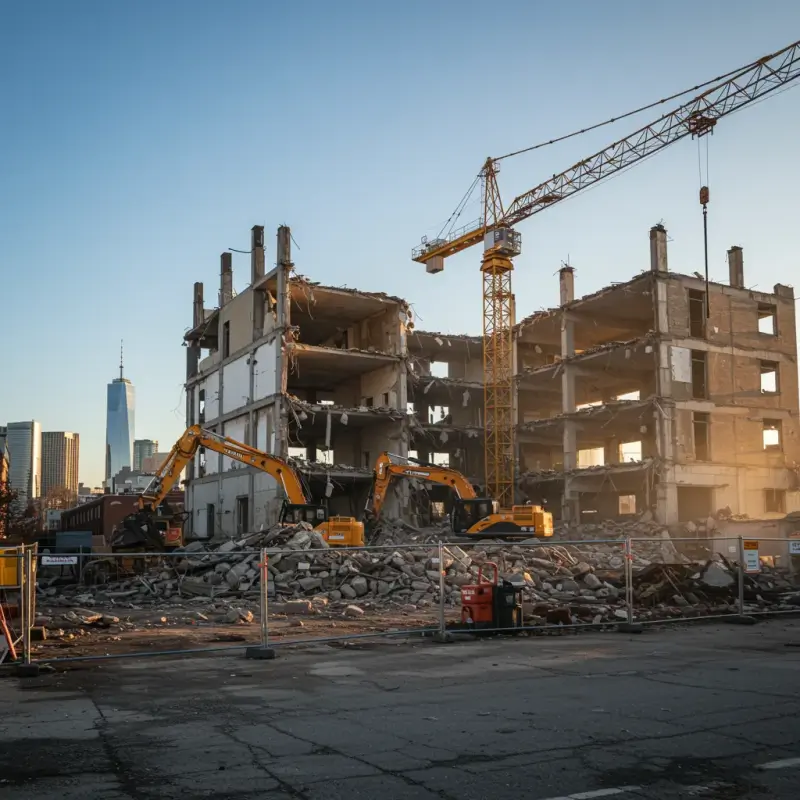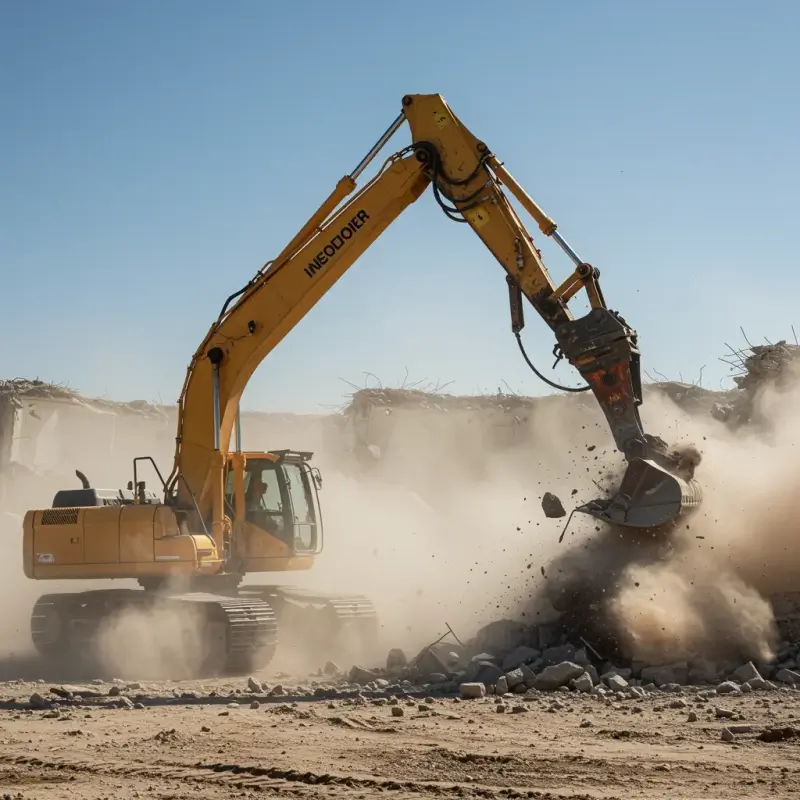Commercial Demolition Guide: Process, Costs, and Hiring Tips
Finding the right crew for a commercial demolition project can make or break your timeline and budget. Whether you're clearing space for new construction or removing a hazardous structure, understanding the commercial demolition process helps you make smarter decisions and avoid costly mistakes.

What Is Commercial Demolition and Why Does It Matter?
Commercial demolition is the controlled teardown of business buildings, warehouses, retail spaces, and industrial facilities. Unlike residential demo work, commercial projects involve larger structures, stricter regulations, and more complex safety requirements.
Property owners choose commercial demolition for several reasons. Some buildings have structural damage that costs more to fix than rebuild. Others need layout changes that renovations can't deliver. Many older properties fail to meet current building codes, making demolition the most practical path forward.
The right approach protects workers, nearby properties, and your investment. A rushed job creates liability issues, regulatory problems, and unexpected costs that derail your entire project.
The Commercial Demolition Process: Step by Step
Pre-Demolition Assessment and Planning
Every successful commercial demolition starts with a detailed site assessment. Inspectors evaluate the building's condition, identify hazardous materials like asbestos or lead paint, and map out utility connections. This upfront work prevents dangerous surprises during teardown.
Engineers analyze structural integrity to determine which demolition method works best. They consider building height, materials, nearby structures, and environmental factors. A warehouse demolition in an open area differs completely from tearing down a downtown retail building surrounded by occupied properties.
Risk analysis identifies potential hazards before they become problems. Teams review everything from underground utilities to overhead power lines. Weather patterns, traffic flow, and access points all influence the demolition plan.
Securing Permits and Meeting Regulations
Commercial demolition requires multiple permits from local, state, and sometimes federal agencies. Permit requirements vary by location, but most projects need:
- Demolition permits from city or county building departments
- Utility disconnect authorizations
- Environmental clearances for hazardous material removal
- Dust and noise control approvals
- Traffic management permits if work affects public roads
Missing permits leads to work stoppages, fines, and legal headaches. Experienced demolition contractors handle the paperwork and ensure compliance with all regulations.
Pro tip: Finding qualified workers who understand permit requirements saves time and money. FlexCrew USA's AI resume builderhelps you identify candidates with commercial demolition experience and regulatory knowledge. Build better teams faster by matching skills to your specific project needs.
Site Preparation and Safety Measures
Before demolition equipment arrives, crews secure the site and protect surrounding areas. This stage includes:
Utility disconnection – Gas, electric, water, and sewer lines must be safely shut off and capped. Failing to properly disconnect utilities creates explosion risks and electrocution hazards.
Safety barriers – Fencing, warning signs, and exclusion zones keep unauthorized people away from the work area. Physical barriers protect both workers and the public.
Dust and debris control – Water suppression systems minimize airborne particles. Tarps and containment systems prevent debris from spreading to neighboring properties.
Site preparation takes time but prevents accidents. Rushing this phase puts people at risk and invites regulatory violations.
The Demolition Phase
Actual teardown methods depend on building size, location, and surrounding structures. Common commercial demolition techniques include:
Mechanical demolition uses excavators, wrecking balls, and hydraulic equipment to systematically dismantle structures. This method works well for most standard buildings and allows for selective demolition when only portions need removal.
Implosion brings down large structures using strategically placed explosives. This technique requires extensive planning and expert execution. It's typically reserved for tall buildings in controlled environments.
Deconstruction involves carefully taking apart a building piece by piece. This slower method maximizes material recovery and recycling. It works well when salvaging valuable materials or when nearby structures require extra protection.
Throughout demolition, supervisors monitor dust levels, vibration, and structural behavior. Real-time adjustments keep work on track and everyone safe.

Waste Management and Material Recycling
Modern commercial demolition prioritizes sustainability. After teardown, crews sort materials into categories:
- Metals (steel beams, copper wiring, aluminum)
- Concrete and masonry
- Wood and timber
- Recyclable materials
- Hazardous waste requiring special disposal
Recycling reduces landfill costs and generates revenue from salvaged materials. Concrete gets crushed for use as fill or road base. Metals go to scrap yards. Quality lumber finds new life in other construction projects.
Proper waste handling also satisfies environmental regulations and improves your project's sustainability profile.
Environmental Cleanup and Site Restoration
Once debris is cleared, environmental teams assess soil conditions and address contamination. Underground storage tanks, chemical spills, and other hazards get properly remediated.
Site grading prepares the land for whatever comes next. Whether you're building immediately or holding the property, proper cleanup protects future development and maintains property value.
Signs Your Commercial Property Needs Demolition
Not every building problem requires demolition, but certain red flags indicate it's time to tear down rather than patch up:
Foundation cracks and structural failures – When load-bearing walls show serious damage or foundations shift significantly, repairs often cost more than rebuilding.
Skyrocketing maintenance costs – If you're constantly fixing HVAC systems, roofs, plumbing, and electrical systems, those expenses add up quickly. At some point, new construction delivers better ROI.
Outdated layouts that limit business operations – Older buildings often can't accommodate modern equipment or flexible workspace designs. Low ceilings, awkward floor plans, and inefficient layouts hurt productivity.
Code compliance issues – Buildings that don't meet current fire safety, ADA accessibility, or energy efficiency standards face expensive retrofits. Starting fresh ensures full compliance.
Poor curb appeal hurting property value – Dated, deteriorating buildings drive away tenants and buyers. A modern structure attracts better business and commands higher lease rates.
Building the Right Demolition Team
Commercial demolition success depends on skilled workers who understand safety protocols, equipment operation, and regulatory requirements. Your team needs:
- Certified equipment operators
- Safety supervisors with demolition experience
- Workers trained in hazardous material handling
- Project managers who understand permitting and compliance
Finding qualified candidates quickly keeps your project moving. FlexCrew USA connects you with pre-screened construction professionals who have the right skills and certifications. Our AI resume builder streamlines hiring by matching candidate experience to your specific demolition project requirements.
Commercial Demolition FAQs
How long does commercial demolition take?
Most commercial demolition projects take 1-4 weeks, depending on building size, demolition method, and site complexity. Small retail spaces might clear in days, while large industrial facilities require several weeks.
What does commercial demolition cost?
Commercial demolition costs typically range from $4-$15 per square foot. Factors affecting price include building size, materials, hazardous waste presence, location, and disposal requirements. Always get detailed quotes from multiple contractors.
Do I need special insurance for commercial demolition?
Yes. Standard property insurance doesn't cover demolition work. You need liability coverage that protects against property damage, injuries, and environmental incidents. Reputable contractors carry comprehensive insurance and provide proof of coverage.
Can I stay open during partial commercial demolition?
Sometimes. Interior demolition of specific areas might allow continued operations in other sections. However, safety concerns, noise, dust, and code requirements often make this impractical. Discuss your situation with demolition experts to evaluate options.
What happens to materials after commercial demolition?
Materials get sorted for recycling, resale, or proper disposal. Metals, concrete, and wood often get recycled. Hazardous materials require special handling and certified disposal. Good contractors maximize recycling to reduce landfill costs.
How do I choose a commercial demolition contractor?
Look for contractors with relevant experience, proper licensing and insurance, positive references, and clear safety records. Verify they handle all permits and understand local regulations. Get detailed written estimates that break down all costs.
Where can I find commercial demolition services near me?
Search for licensed commercial demolition contractors in your area through local business directories, construction associations, or workforce platforms. Check online reviews, verify credentials, and request site visits before making your decision.
What's the difference between commercial demolition and residential demolition?
Commercial demolition involves larger structures, stricter safety regulations, more complex permits, and specialized equipment. Commercial projects require experienced crews familiar with industrial safety standards and environmental compliance.
Ready to build your commercial demolition crew? FlexCrew USA's AI resume builder helps you find qualified construction professionals fast. Screen candidates efficiently, match skills to project needs, and build stronger teams. Start building your crew today.
